WooCommerce continues to be a dominant force in the eCommerce world, powering millions of online stores with its flexibility and robust feature set. As we move into 2024, new trends and technological advancements are shaping the future of WooCommerce development.
Staying ahead of these trends is crucial for businesses looking to enhance their online presence and deliver an exceptional customer experience.
Here are the top WooCommerce development trends to watch in 2024.
1. AI and Machine Learning Integration
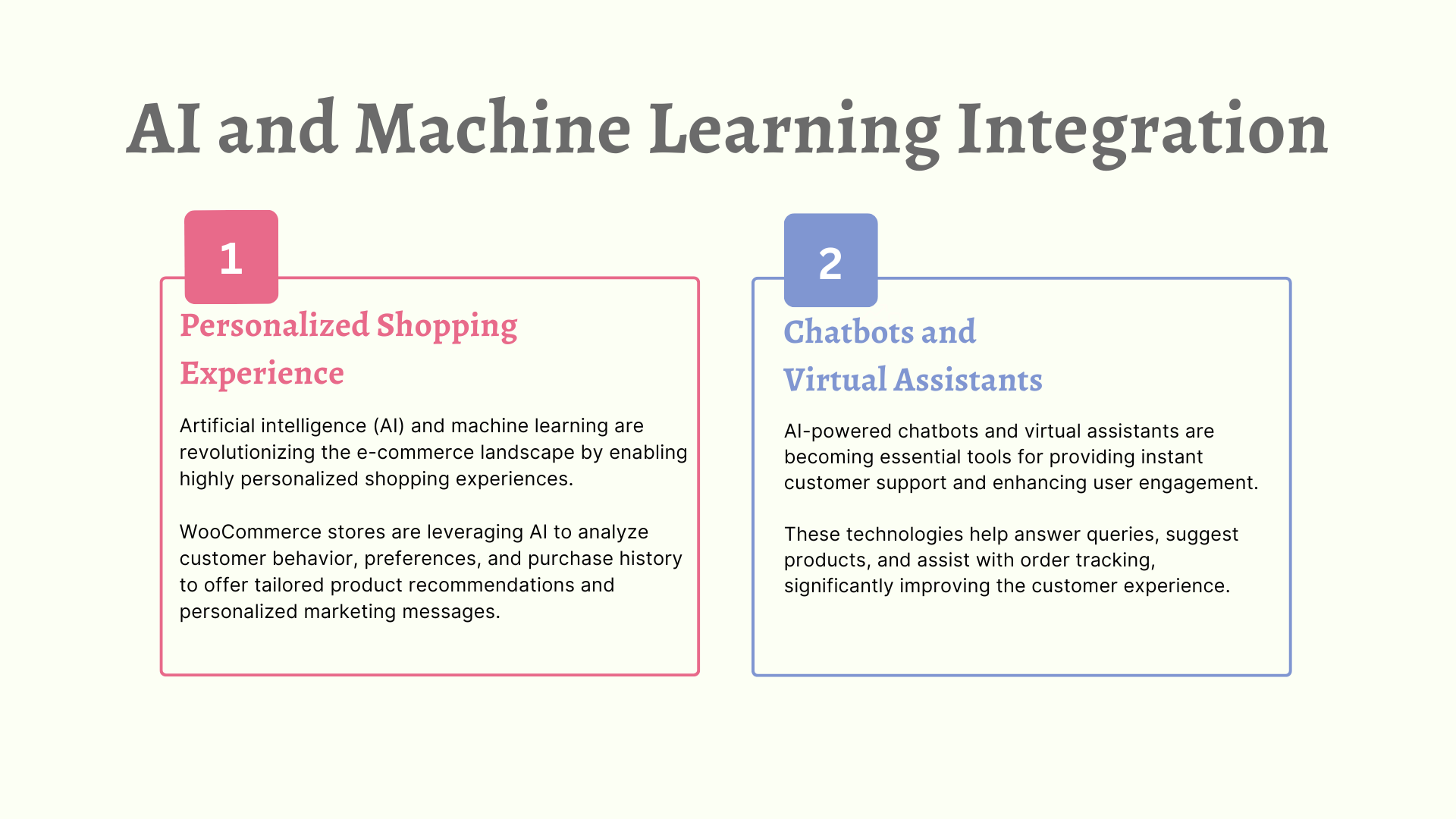
- Personalized Shopping Experiences
Artificial intelligence (AI) and machine learning are revolutionizing the eCommerce landscape by enabling highly personalized shopping experiences.
WooCommerce stores are leveraging AI to analyze customer behavior, preferences, and purchase history to offer tailored product recommendations and personalized marketing messages.
- Chatbots and Virtual Assistants
AI-powered chatbots and virtual assistants are becoming essential tools for providing instant customer support and enhancing user engagement.
These technologies help answer queries, suggest products, and assist with order tracking, significantly improving the customer experience.
2. Augmented Reality (AR) and Virtual Reality (VR)
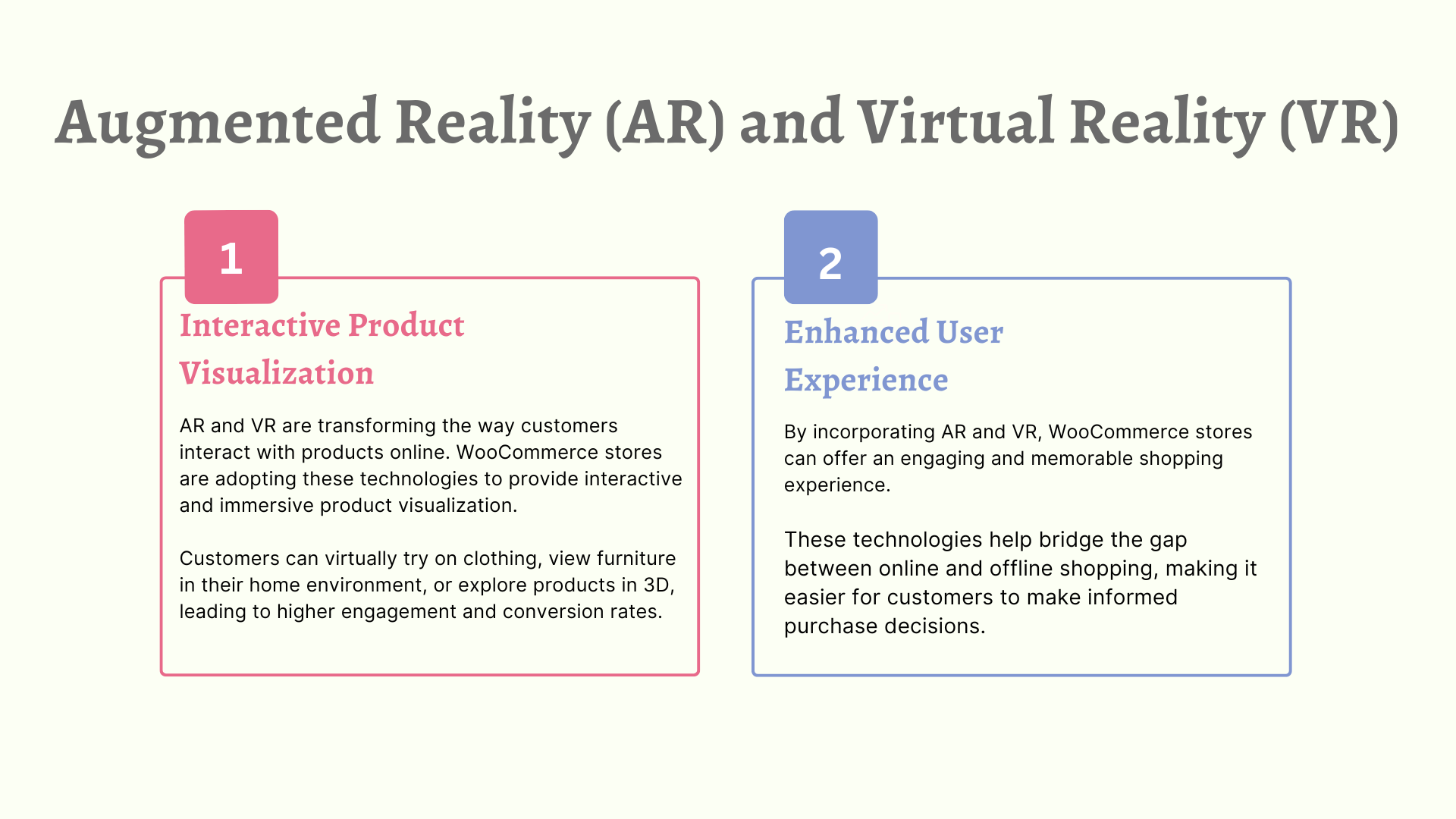
- Interactive Product Visualization
AR and VR are transforming the way customers interact with products online. Online stores are adopting these technologies to provide interactive and immersive product visualization.
Customers can virtually try on clothing, view furniture in their home environment, or explore products in 3D, leading to higher engagement and conversion rates.
- Enhanced User Experience
By incorporating AR and VR, eCommerce stores can offer an engaging and memorable shopping experience. These technologies help bridge the gap between online and offline shopping, making it easier for customers to make informed purchase decisions.
3. Mobile-First WooCommerce Development
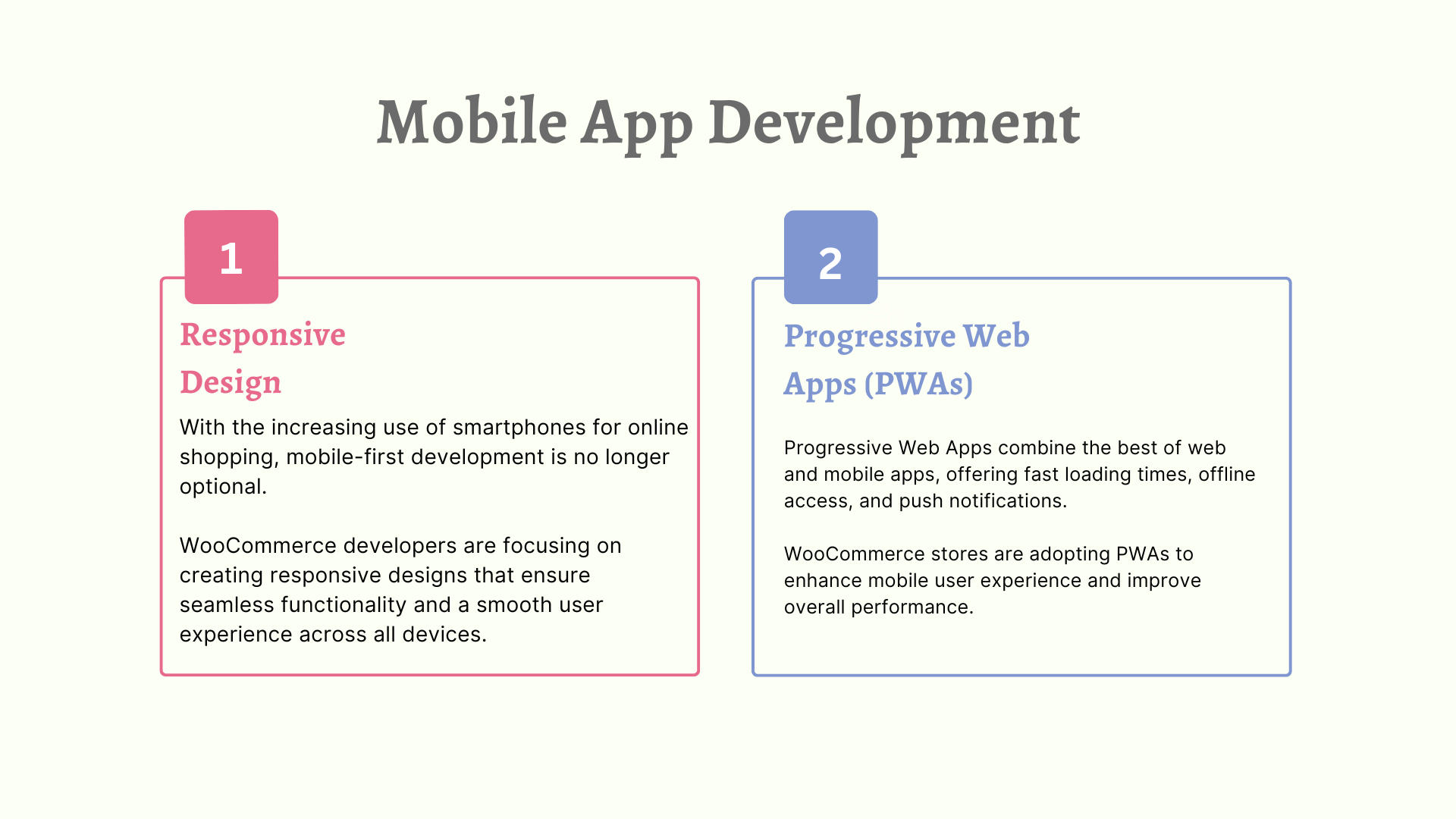
- Responsive Design
With the increasing use of smartphones for online shopping, mobile-first WooCommerce development is no longer optional.
WooCommerce developers are focusing on creating responsive designs that ensure seamless functionality and a smooth user experience across all devices.
- Progressive Web Apps (PWAs)
Progressive Web Apps combine the best of web and mobile apps, offering fast loading times, offline access, and push notifications.
WooCommerce stores are adopting PWAs to enhance mobile user experience and improve overall performance.
4. Voice Commerce
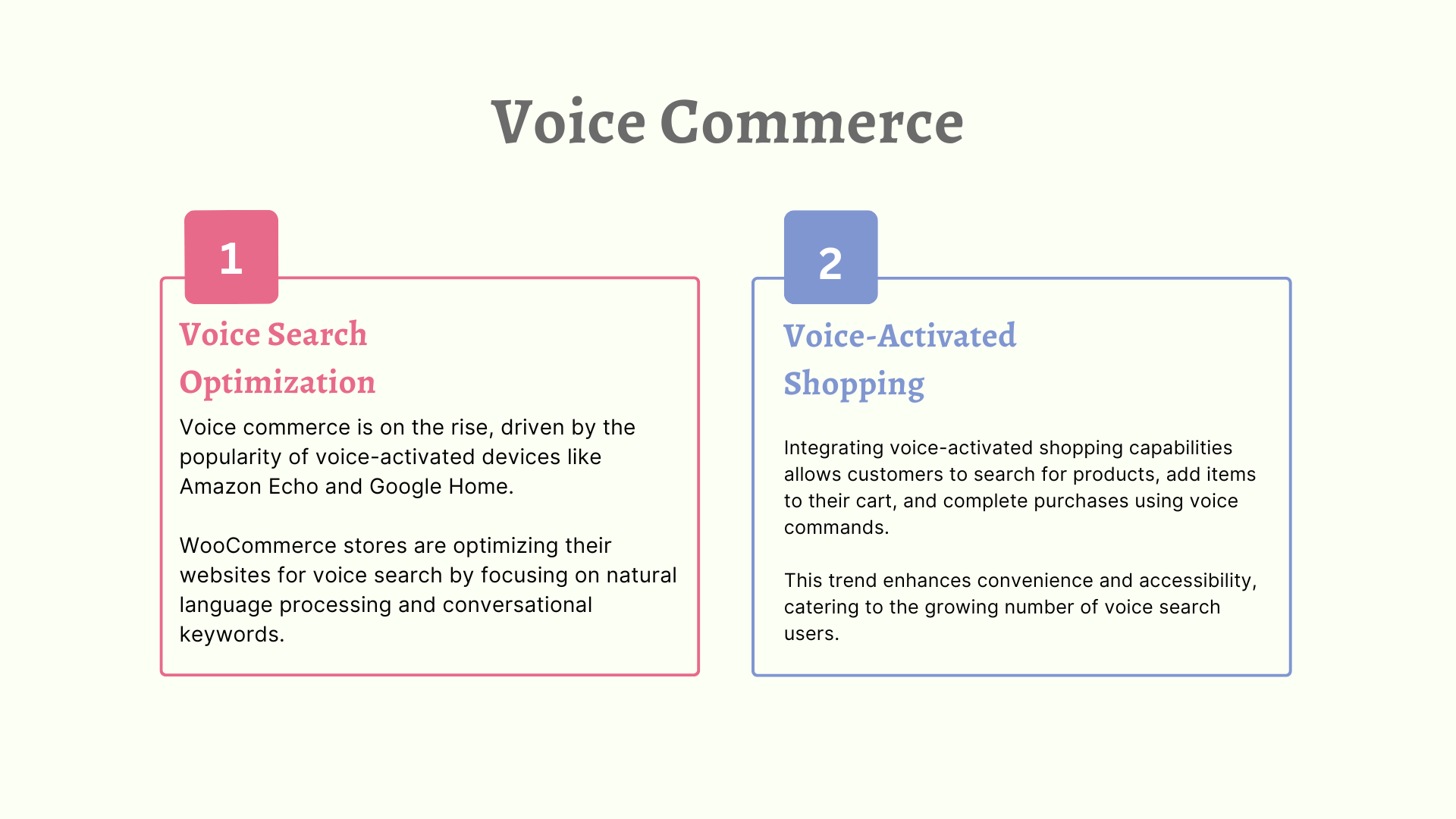
- Voice Search Optimization
Voice commerce is on the rise, driven by the popularity of voice-activated devices like Amazon Echo and Google Home.
eCommerce stores are optimizing their websites for voice search by focusing on natural language processing and conversational keywords.
- Voice-Activated Shopping
Integrating voice-activated shopping capabilities allows customers to search for products, add items to their cart, and complete purchases using voice commands.
This trend enhances convenience and accessibility, catering to the growing number of voice search users.
5. Advanced Analytics and Reporting
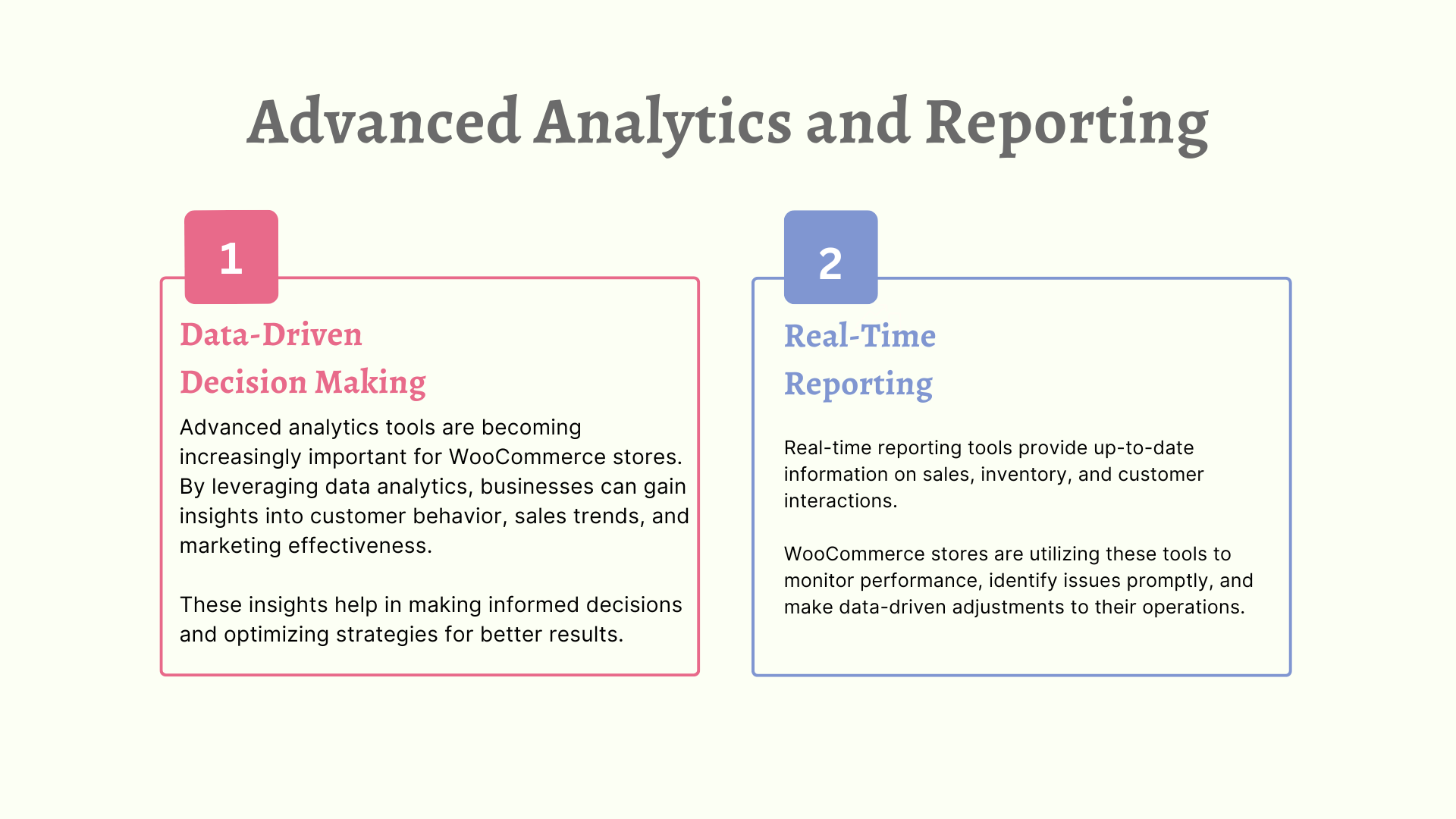
- Data-Driven Decision Making
Advanced analytics tools are becoming increasingly important for WooCommerce stores. By leveraging data analytics, businesses can gain insights into customer behavior, sales trends, and marketing effectiveness.
These insights help in making informed decisions and optimizing strategies for better results.
- Real-Time Reporting
Real-time reporting tools provide up-to-date information on sales, inventory, and customer interactions.
eCommerce stores are utilizing these tools to monitor performance, identify issues promptly, and make data-driven adjustments to their operations.
6. Enhanced Security Measures
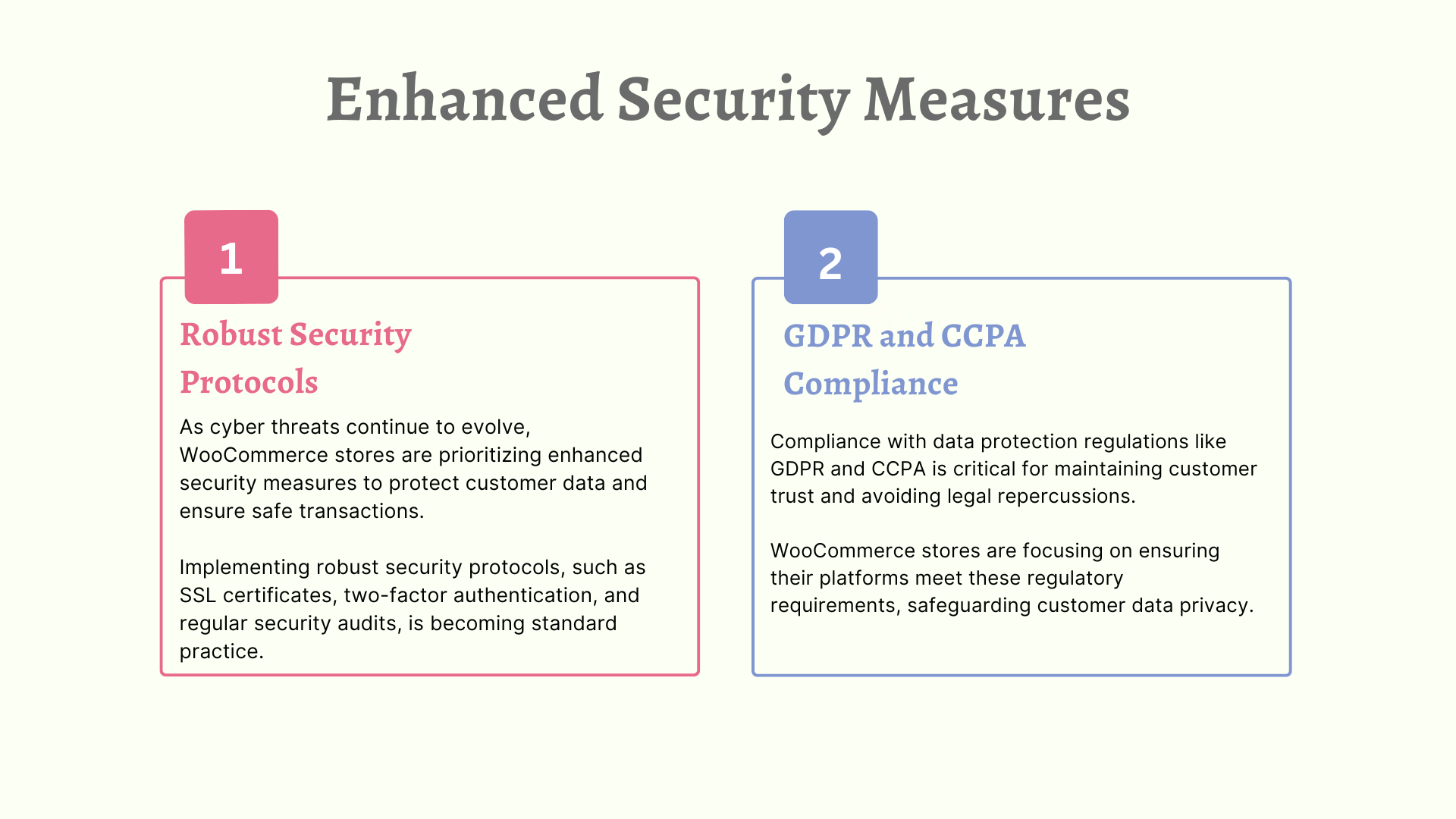
- Robust Security Protocols
As cyber threats continue to evolve, WooCommerce stores are prioritizing enhanced security measures to protect customer data and ensure safe transactions.
Implementing robust security protocols, such as SSL certificates, two-factor authentication, and regular security audits, is becoming standard practice.
- GDPR and CCPA Compliance
Compliance with data protection regulations like GDPR and CCPA is critical for maintaining customer trust and avoiding legal repercussions.
eCommerce stores are focusing on ensuring their platforms meet these regulatory requirements, safeguarding customer data privacy.
7. Subscription-Based Models
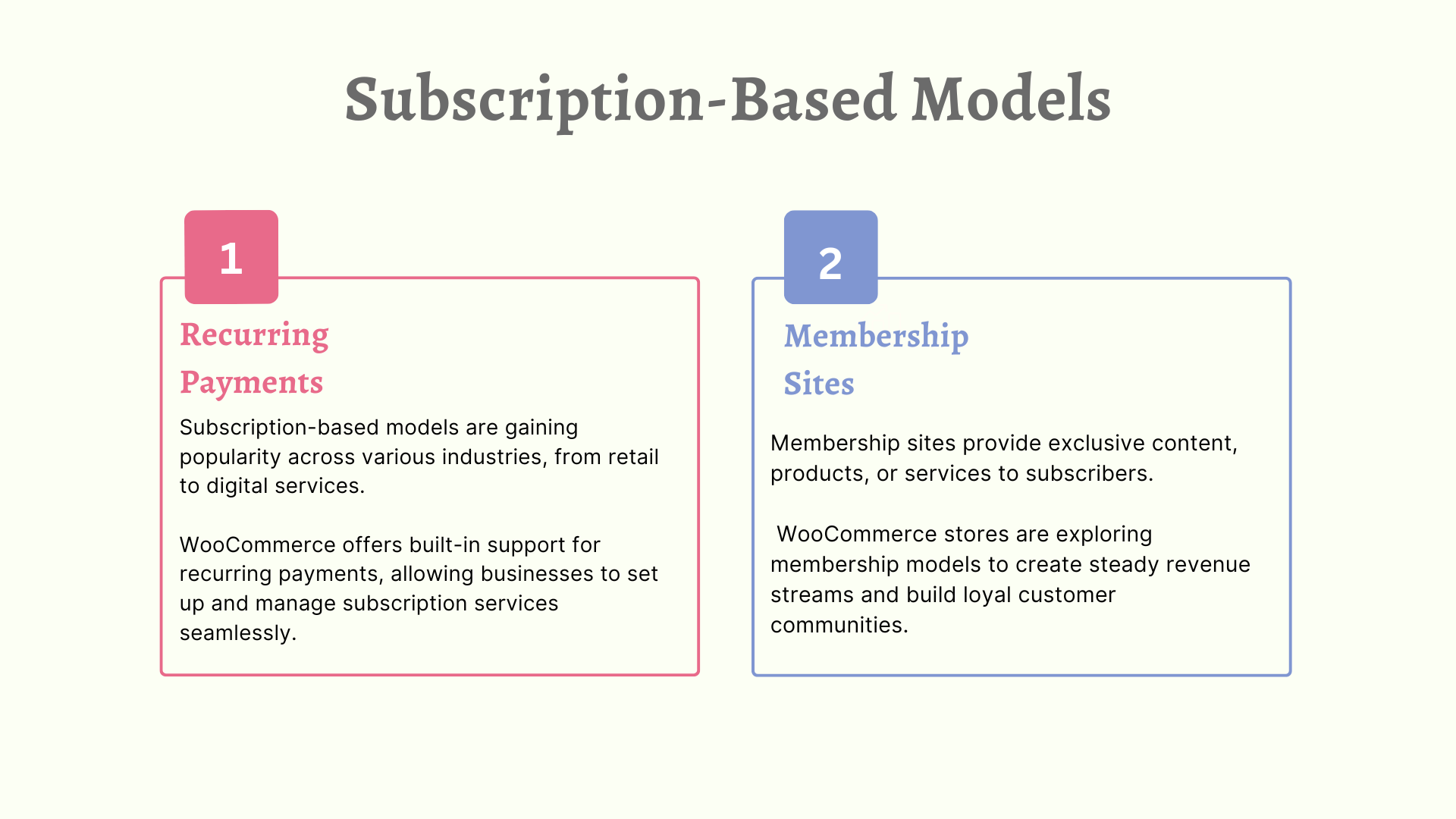
- Recurring Payments
Subscription-based models are gaining popularity across various industries, from retail to digital services.
WooCommerce offers built-in support for recurring payments, allowing businesses to set up and manage subscription services seamlessly.
- Membership Sites
Membership sites provide exclusive content, products, or services to subscribers. WooCommerce stores are exploring membership models to create steady revenue streams and build loyal customer communities.
8. Eco-Friendly and Sustainable Practices
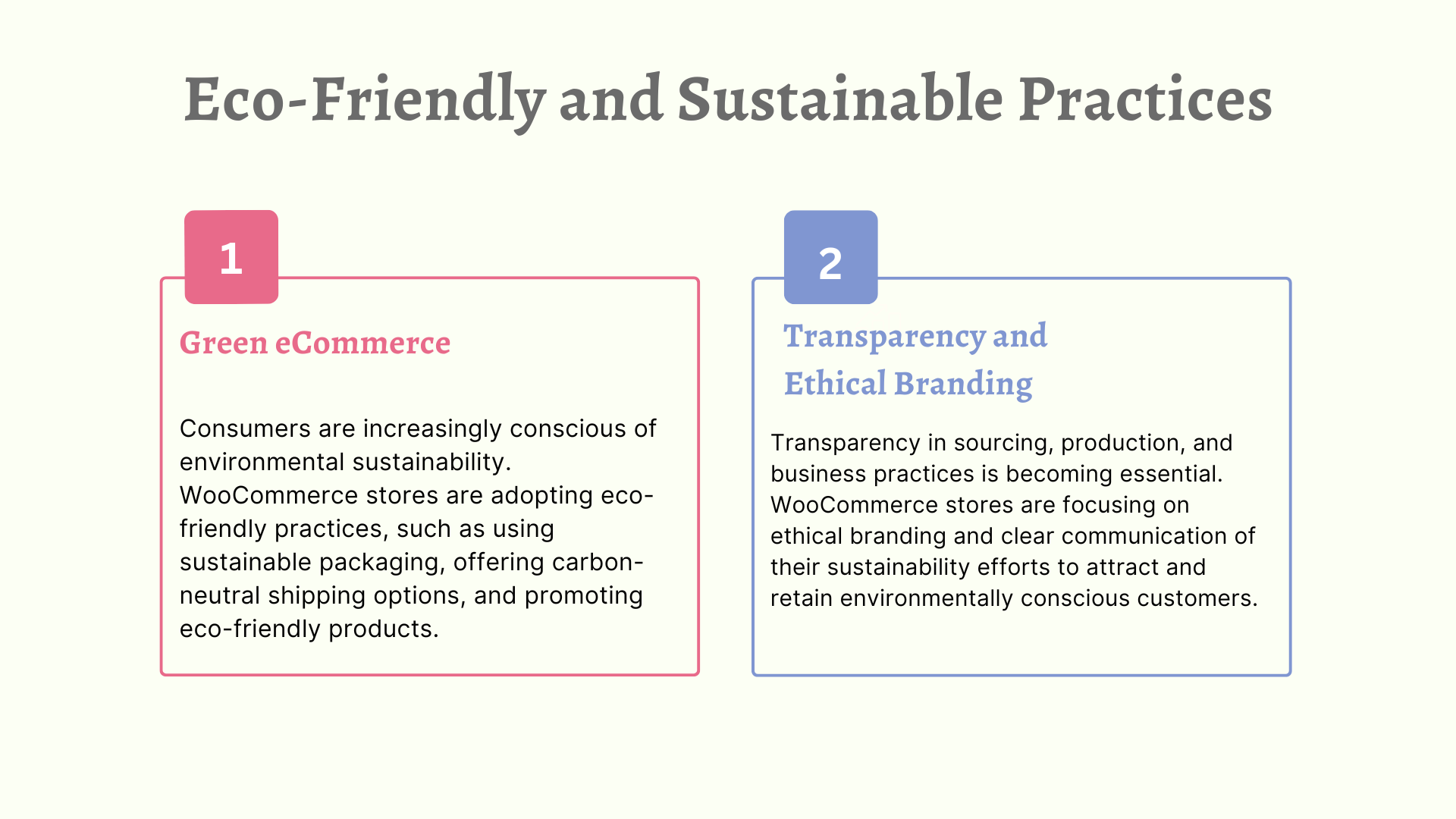
- Green E-Commerce
Consumers are increasingly conscious of environmental sustainability. eCommerce stores are adopting eco-friendly practices, such as using sustainable packaging, offering carbon-neutral shipping options, and promoting eco-friendly products.
- Transparency and Ethical Branding
Transparency in sourcing, production, and business practices is becoming essential. WooCommerce stores are focusing on ethical branding and clear communication of their sustainability efforts to attract and retain environmentally conscious customers.
9. Headless Commerce
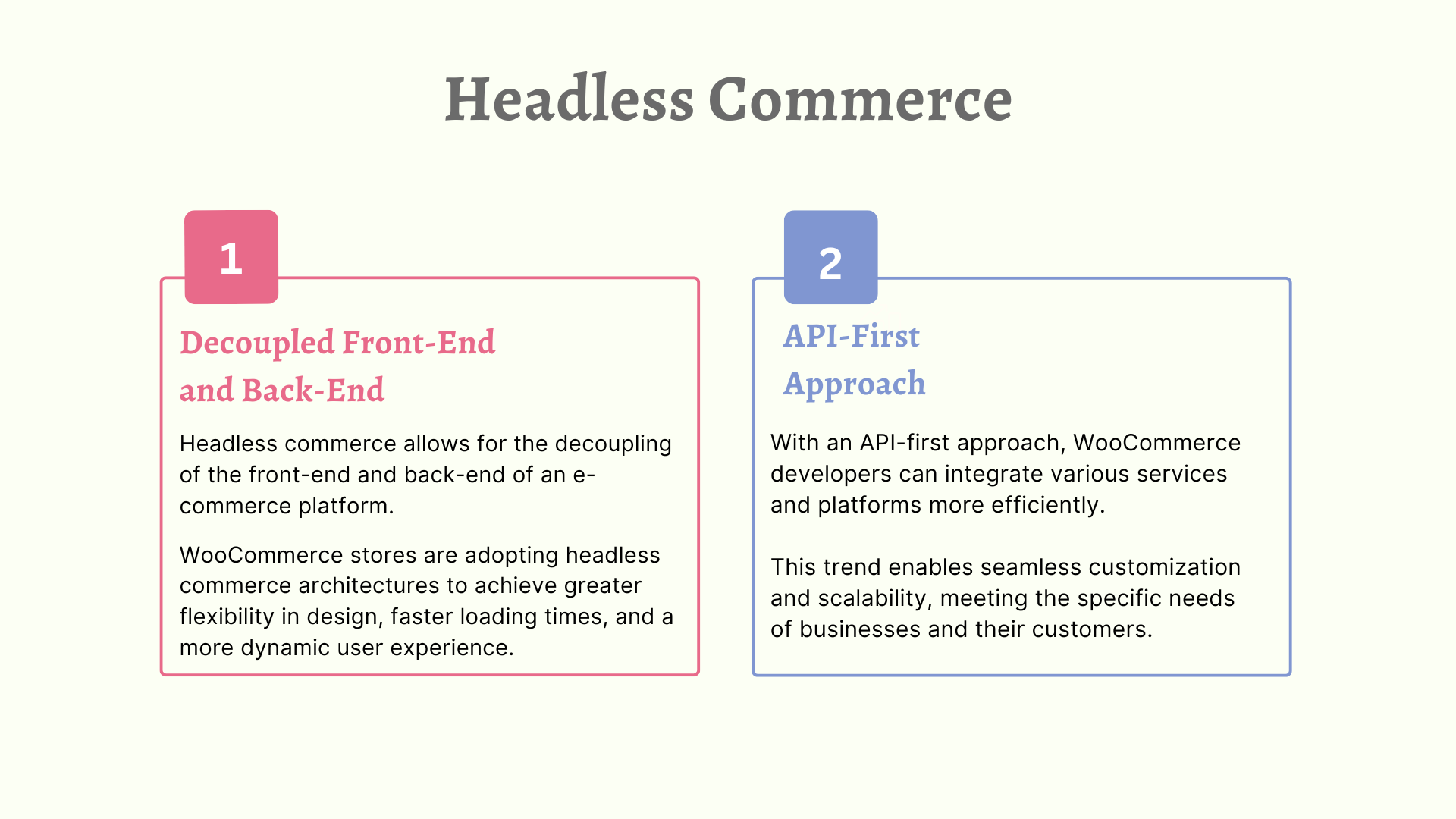
- Decoupled Front-End and Back-End
Headless commerce allows for the decoupling of the front-end and back-end of an eCommerce platform.
eCommerce stores are adopting headless commerce architectures to achieve greater flexibility in design, faster loading times, and a more dynamic user experience.
- API-First Approach
With an API-first approach, WooCommerce developers can integrate various services and platforms more efficiently.
This trend enables seamless customization and scalability, meeting the specific needs of businesses and their customers.
10. Social Commerce
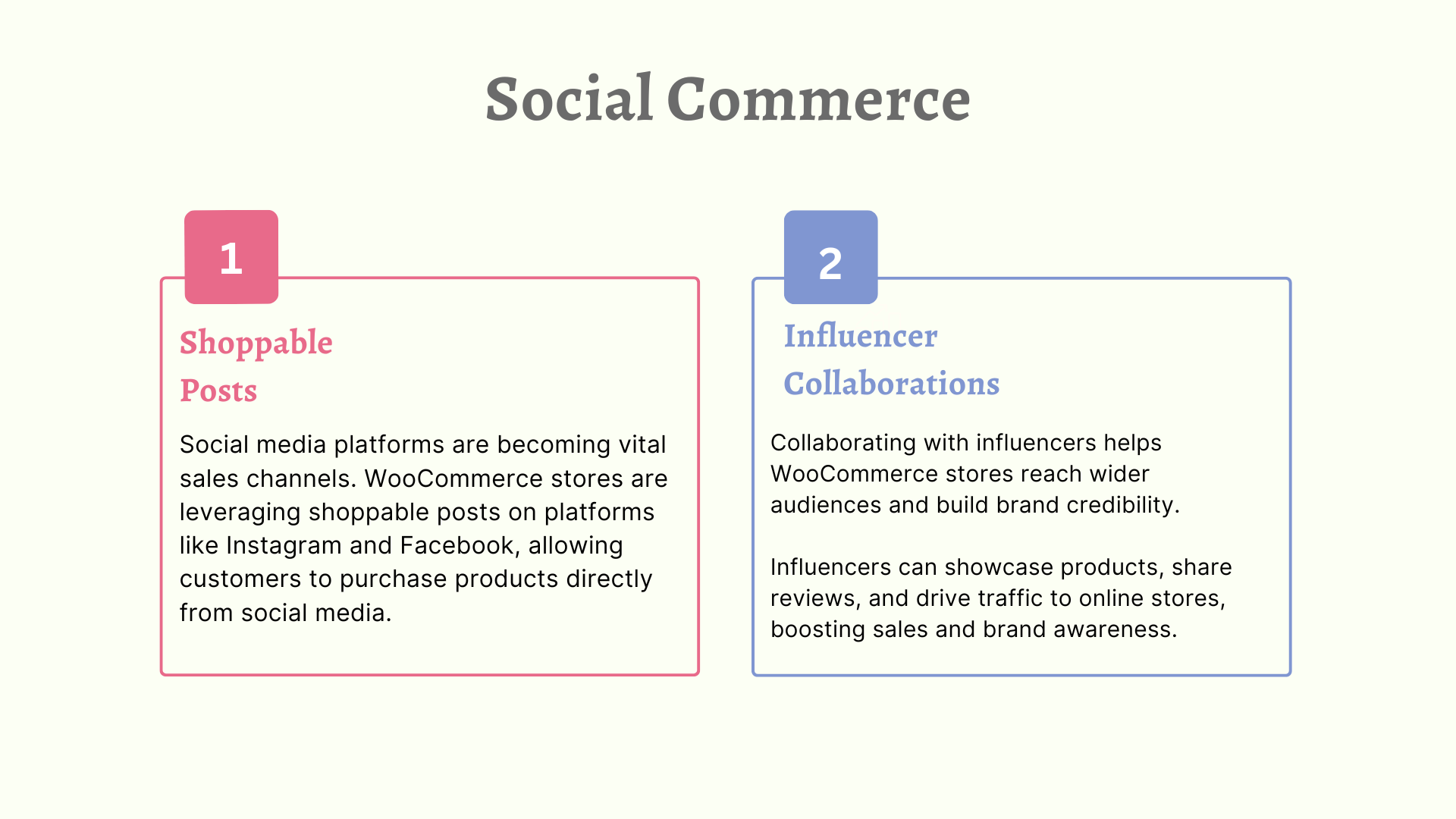
- Shoppable Posts
Social media platforms are becoming vital sales channels. WooCommerce stores are leveraging shoppable posts on platforms like Instagram and Facebook, allowing customers to purchase products directly from social media.
- Influencer Collaborations
Collaborating with influencers helps eCommerce stores reach wider audiences and build brand credibility.
Influencers can showcase products, share reviews, and drive traffic to online stores, boosting sales and brand awareness.
Conclusion
The eCommerce landscape is continuously evolving, and staying ahead of the trends is crucial for the success of your WooCommerce store.
By embracing AI and machine learning, AR and VR, mobile-first WooCommerce development, you can ensure your business remains competitive and delivers an exceptional customer experience. At BeePlugin we embrace the latest WooCommerce development trends to ensure your online stores are highly-optimized and driven to boost sales.
As we move through 2024, integrating these trends into your WooCommerce strategy will not only enhance your online presence but also drive growth and innovation.


 Article
Article
 Infographic
Infographic
 Plugin Development
Plugin Development
 WordPress Development
WordPress Development
 WooCommerce Development
WooCommerce Development






Jay